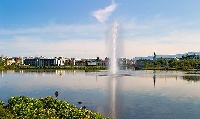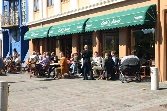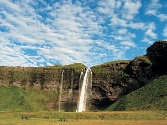Information on Reykjavik
Reykjavík is home to about 190.000 inhabitants. It is young, lively and entertaining city with lot of interesting museums, galleries and delightful restaurants and cafés where one can sample exotic Icelandic dishes or international cuisine. Among the highlights in the city are The National museum, the Hallgrimskirka church Höfði mansion, Althingi or the Parliament, City Hall, the fishing harbour and The Pearl, an observatory with fantastic panorama of the city.
|
|
After marvelling at Reykjavik’s museums and other tourist attractions, the thermal swimming pools are worth dipping into before returning to the hotel. The geothermal swimming pools have a controlled temperature that can reach as high as 44°C or 111°F during specific hours of the day.
The beautiful landscape around Reykjavik and the numerous green areas within the city are perfect for all kinds of outdoor activities. Visitors to Reykjavik will be impressed by the city’s proximity to nature and struck by the cleanliness of the city itself. There are plenty of possibilities when planning outdoor activities during your stay in the capital.
Facts about Iceland
Iceland is an island located in the North Atlantic Ocean between mainland Europe and Greenland with a total area of 103,000 km² (39,756 sq.miles). Iceland's population is around 313.000 of which the vast majority or around 2/3 lives in the capital, Reykjavik, and surrounding areas.
Situated on the Mid-Atlantic Ridge, Iceland is volcanically and geologically active on a large scale. 30 post-glacial volcanoes have erupted in the past two centuries, and natural hot water supplies much of the population with cheap, pollution-free heating. The interior of the country contains stunning contrasts. The country is largely an arctic desert, punctuated with mountains, glaciers, volcanoes and waterfalls.
Iceland has a pure, pollution-free environment. It is a modern European economy with strong economic foundations in fisheries, natural renewable energy sources and human capital. Industry is operated almost exclusively with clean hydroelectric and geothermal power.
The weather in Iceland is very mild. The average summer temperature in Reykjavik is 11.8°C/ 53°F in July, with average highs of 24.3°C/76°F.
Icelandic is the national language and is believed to have changed very little from the original tongue spoken by the Norse settlers. It is one of the Nordic languages, which are a sub-group of the Germanic languages. Iceland is alone in upholding a Norse tradition, i.e. the custom of using patronymics rather than surnames; and Icelander´s Christian name is followed by his or her father´s name and the suffix -son or -dóttir, e.g. Guðrún Pétursdóttir (Guðrún, daughter of Pétur). Members of a family can therefore have many different "surnames", which sometimes causes confusion to foreigners.
English and Danish are widely spoken and understood in Iceland.
Experience Iceland
Optional tours in connection with the conference will be available. More information on the tour information page.
Practical information
Climate
Thanks to the Gulf Stream, Iceland has a mild temperate ocean climate, cool in the summer and surprisingly mild in the winter. During the mid-summer, temperatures generally average between 12° and 15° C (50°-54° F) The average temperature in January, the coldest month, is warmer than in New York or Vienna. Iceland is among the most pollution free countries. During the summer months June and July Icelanders do enjoy almost 24- hour daylight.
For weather forecast in Iceland, the Icelandic Meteorological Office
Currency exchange
The Icelandic monetary unit is the "króna." Cash can be obtained against most common cards in all ATM banks, which are to be found in most of the bigger hotels in Reykjavík. The Icelandic króna is appr. 112 USD or 155 EUR.
For exchange rate, Central Bank of Iceland
Opening hours
General office hours are usually 09:00-16:00/ 9:00 AM-4:00 PM in July. Shopping hours are Mon-Fri 09:00-18:00/ 9:00 AM- 6:00 PM, Sat from 10:00-14:00/ 10:00 AM-2:00 PM. Some supermarkets and gas stations are open 24/7. Banking hours are Mon-Fri 09:15-16:00/ 9:00-4:00 PM .
Time
Iceland is on Greenwich Mean Time (GMT), New York -4, Brussels +2, London +1.
Tax and Tipping
Taxes and services are always included in all prices for restaurants, hotels, taxis etc. Tipping is not customary in Iceland.
Duty free shopping/Tax Free shopping
Duty-free goods may be purchased both upon arrival and departure at Keflavík International Airport. A refund of local Value-Added Tax (VAT) is available to all visitors in Iceland. The refund will result in a reduction of up to 15% of the retail price, provided departure from Iceland is within 3 months after the date of purchase.
Electricity
The main voltage is 220volts, 50Hz. Appliance sockets are usually plugs with round pins.
Medical help
There is a medical centre or a hospital in all major cities and towns in Iceland. The emergency phone number (24 hours) in Iceland is 112.
Questions
If you need more information about your pre- or post-conference stay in Iceland, you can contact Iceland Congress by mail to info@icelandcongress.is


